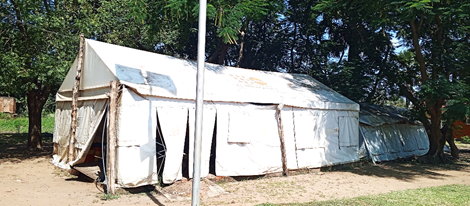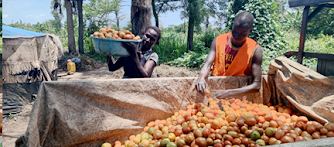DRDIP Gave Us Direction and Hope, - Kyegegwa Woman
Things
are not the same again for Grace Bitaranza, a 35-year-old mother of four from
Iringa village, Mpaala Sub County in Kyegegwa district. She is grateful for the
livelihoods support sub project to women in her village through the Development
Response to Displacement Impacts Project (DRDIP), an initiative under Office
of the Prime Minister, funded by the World Bank. She narrates her ordeal to Robert Owiny.
Two
years ago, Bitaranza was oblivious of how she would raise her children. She had
challenges of feeding, she was troubled by her children’s school requirements,
she had no business and not any family asset to proudly talk about. “You know,
here we are far from town and most projects do not reach us”, she explains,
adding that it’s difficult to get any form of work in her village where one can
earn from, be it mere casual work.
One day, she recounts, “my children were all sent away from school because of school fees and other requirements”. This was when Bitaranza and her husband felt entombed and “my husband didn’t sleep that night”, she remembers. “He kept on asking me, Grace, what do we do? What shall we do now? as he changes position on the bed as if he had pain throughout his body”.
 |
| Grace Bitaranza posing in front of her newly built shop |
Bitaranza
surely had no answer to her husband’s painful questions as they couldn’t even
get money out of the foodstuff they had harvested for the season from their
small garden. “There were no buyers any near by that time”, she reflects.
Her
village had no market and it was difficult to get somebody to buy agricultural
products. “It was so difficult, but the hardship taught me to start thinking of
doing something so as to support my husband in raising our four children”, she ironically
appreciates.
In
order to implement her decision to support her husband, Bitaranza and a group
of other 10 women and one man started a Village Savings and Loaning Association
(VSLA) that later benefited from interventions of the DRDIP Livelihoods component.
At
the start, theirs was only a loose arrangement of a VSLA group of sort in the
village, but they didn’t have proper knowledge of making profits. The group had
no investment plan and the group members saved very little amounts of money.
Some members could fail to save on weekly basis although the savings were as
low as 1,000 Uganda Shillings. This made it difficult to even get a reasonable
loan from the group.
Bitaranza
recollects that, DRDIP intervened through training their group members on the
five VSLA core principles such as; mandatory weekly meetings, weekly savings,
inter-loaning, timely repayment and proper records keeping. The training helped
the largely women group to maximize savings and discuss investment strategies
so as to attract more interest through loaning out huge sums to members.
The
group also received training on the four core responsibilities of promoting;
housing, health, sanitation and education. This aspect motivated the members to
embark on achieving something at individual levels but also as a group.
DRDIP
further gave this group start-up capital worth 22,500,000Ush. This amplified
Bitaranza’s group. “We decided as a group to acquire a piece of land and build
a shelter that could allow members and other farmers to assemble their
agricultural products for sale”. Members used the shelter mainly as a selling
point for bananas (matoke) since all of them plant matoke but lacked a market
for it.
By
putting their matoke together, the group attracted buyers from Kyegegwa town. Trucks
started coming every day to buy matoke in bulk from these group shelter (market
of sort) located in Iringa village, Mpala Sub County. This allowed the group to
earn reasonable amounts of money as individuals and maximize their weekly
savings. Other members including non-members started dealing in other items such
as; goats, chicken, Irish potatoes, sweet potatoes etc. This turned this village
spot into a busy trading center attracting many buyers and sellers from far and
wide.
Bitaranza
on her part got loans several times and within one year, she was able to
build a small commercial house where she currently runs a shop. “I relied
purely on group loans to also buy land and to complete this house”, she says. “Let
me tell you, I took advantage of the COVID-19 lockdown since children are not
in school and started up many things that can now earn me money”, Bitaranza proudly
adds.
Apart from running a general merchandise shop, Bitaranza also keeps poultry and goats which she uses to raise more money for weekly savings and to continue managing her group loan obligations. Today, Bitaranza feels stable enough to raise her four children and pay their school fees up to university. Looking back today, she feels that things are never the same again. She is grateful to DRDIP project and to the World Bank for supporting vulnerable communities.



Comments
Post a Comment